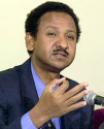Sudanese Foreign Minister optimistic about peace in Darfur
 DAKAR, Senegal, Oct 30, 2004 (PANA) — Sudanese Foreign Minister Mustapha Osman Ismaiel has expressed optimism about
DAKAR, Senegal, Oct 30, 2004 (PANA) — Sudanese Foreign Minister Mustapha Osman Ismaiel has expressed optimism about
major breakthrough in regional talks to end the
conflict in Sudan’s western region of Darfur, which
has displaced more than one million people.
“I am hopeful that by the end of this year peace will
return to Darfur if all stakeholders demonstrate the
required political will,” the Minister told PANA Friday
in Dakar.
Nigerian President Olusegun Obasanjo in his capacity as
Chair of the African Union (AU) is hosting peace talks
in Abuja between the Sudanese government and the two main
Darfur rebels – the Sudan Liberation Army (SLA) and the
Justice and Equality Movement (JEM).
Libyan leader Colonel Moammar Kadhafi has also hosted
a crucial summit involving five African leaders including those
from Chad, Egypt, Nigeria and Sudan, which produced a Tripoli
Declaration, a roadmap to the settlement of the Darfur
conflict that erupted in February last year pitting the
Khartoum government against JEM and SLA, which are seeking
self-determination from Sudan.
Ismaeil, in Dakar to brief President Abdoulaye Wade on the
the peace efforts on Darfur, said the Senegalese leader has
pledged that his country would tribute troops to boost the AU
peace monitors in Darfur.
“The Khartoum government admits there is a problem in Darfur,
which African governments are trying to solve through the
mechanism of the African Union, but enemies of Sudan, Africa
and Afro-Arab unity have continued to exaggerate and manipulate
the crisis for political gains,” Ismaiel said.
He said apart from internal peace measures and commitment to
the regional peace talks, Sudanese President Omar El-Bashir,
has welcomed the deployment of AU ceasefire monitoring and
protection forces as agreed in Addis Ababa by the AU Peace
and Security Council.
The AU has agreed to raise its ceasefire monitoring and
protection force to 3,200 including police personnel and
civilian observers.
Ismaiel said the Sudan government, which has the primary
responsibility of maintaining security within the country
has committed 40,000 soldiers and 20,000 police personnel to
restore stability in Darfur.
The Minister said that at the Tripoli summit, both the
Khartoum government and the rebel movements refused and
rejected foreign intervention in Darfur, which he said could
escalate the conflict to the magnitude of Iraq.
On whether the AU peace monitors would be sufficient to restore
peace in Darfur, Ismaiel said: “We do not want a situation like
in Iraq where the US has more than 130,000 troops that have not
been able to contain the insurgents.”
“It is not the number of monitors, but the political will and
commitment of those involved,” he said, citing the situation in
Nubia Mountains and Blue Nile in South Sudan, where he said it
took only seven monitors for a ceasefire to hold between the
Khartoum government and the Sudan People’s Liberia Movement.
According to Ismaiel those “who are asking for more troops want
the AU to fail,” adding that Darfur with some 80 tribes required
proper handling so that ceasefire monitors or protection forces
are not drawn into avoidable tribal war.
The Minister also raised the issue of logistics and funding of
peace monitors, saying the international community should help
but “those with a hidden agenda should stop giving wrong
signals.”
He said those pursing political interest in Sudan, had labelled
the crisis “genocide,” but have been unable to sustain that
claim, just as the World Health Organisation (WHO) has been
unable to present documentations to support the claim that some
70,000 people had died in Darfur.
Ismaeil said at Darfur various peace talks emphasis has been
placed on improving the humanitarian situation, security,
socio-economic issue and political settlement.
He said while the pressure might be on the government, Sudanese
as a whole have a duty to restore peace to their country.
“It is not only the government, but the entire country that is
suffering the problem of bad international image. The rebels
should embrace peace and stop fighting just for the sake of
fighting,” he urged.
The Minister also called on Sudan’s neighbours, especially
Eritrea, which he accused of serving as a haven for rebels,
to respect the African spirit of good neighbourliness and
solidarity.
“The era of the Cold War when Super powers fought by proxy with
countries destabilising their neighbours is over,” he said,
adding that the African Union constitutes a rallying point for
solution to Africa’s problem.
